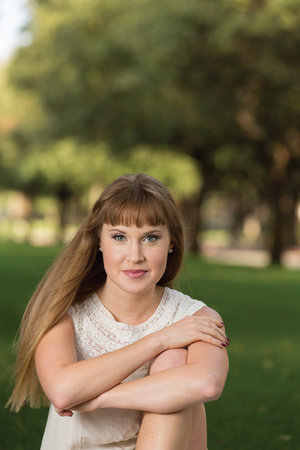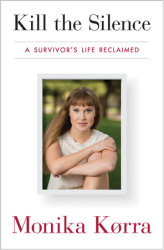In November 2009, what defined Norway transplant Monika Kørra was her track star status. She was a cross-country runner in Dallas, Texas, granted a full scholarship by Southern Methodist University.
Come December, she would be the victim of rape. Kidnapped at gunpoint by three men in a van, she was sexually assaulted for ninety minutes, then abandoned in an empty field. Shortly thereafter, Kørra vowed to not let the trauma of that experience define her or dampen her spirits. She created the Monika Kørra Foundation to promote awareness and education around sexual assault, and she is most recently the author of Kill the Silence, bearing the torch of hope and empowerment for victims of sexual assault.
Below, she discusses the vulnerability she felt in writing Kill the Silence, and further explains how she hopes the book can break the hushed stigma associated with sexual crimes.
PENGUIN RANDOM HOUSE:Did you write this book for your own recovery? To help spread the word of the Monika Kørra Foundation? Or was it something else entirely that motivated you?
Monika Kørra: Writing was the beginning of my healing process. Just two days after the attack, I started writing in a diary, detailing what I’d been through. Up until that point, I was unable to release or express any emotions, but as I started writing and recounting that night, I broke down and cried for hours. Even though it hurt, I felt so much better afterwards. So I realized then that even though it was tough to revisit my nightmare, it was needed and it helped clear my head — it was like I could take all of those terrible memories and thoughts out of my head, put them on pieces of paper in a book, and then I could close the book and put it away. I continued to write as a form of self-help. About a year later, I thought to myself, I need to share this with others who have suffered — we all go through challenges in life and we need to help each other get through them.
PRH:What do you want people to take away from your story?
MK: I want it to give people hope. It is possible to find a way back to a normal, healthy, and happy life despite the challenges we face. Sometimes we have to simply dig deep, and I think there’s a lot of truth to the saying: “You never know how strong you are until being strong is the only choice you have.”
PRH:What was the most important element of support following your attack?
MK: The message that I received from family and friends: “you are not alone, we are in this together.” And that message was delivered more through their actions than words. It is easy to tell someone, “Let me know if I can help you in any way,” but to show it through actions, by being present, helping you get your mind off horrible things and listening when needed, that’s what truly matters and gives comfort.
PRH:You talk about how closure is not realistic in traumatic events, how the aftermath will always affect you. How has your dedication toward helping other rape and abuse survivors helped you achieve peace, if not closure?
MK: Even though I will never forget, I won’t let what happened to me hold me back in any way. To be able to help others is what gives my life a deeper meaning. I think I survived that night for a reason; this is my purpose in life: to help others through sharing my story.
PRH:What was the most challenging piece of sharing your story in this format?
MK: The most challenging thing for me in this process has been letting my guard down, being vulnerable, honest, and open about everything, my good days and bad days, and sharing not just my strengths, but also my weaknesses. I’m an athlete, I’m Norwegian and I am wired in a competitive way, always trying to maintain a strong, controlled exterior. In my book, I reveal who I really am and that in no way am I always strong, confident, or in control — but that is what makes this book worth reading.













